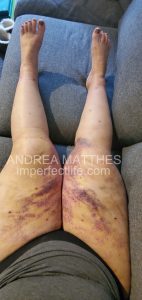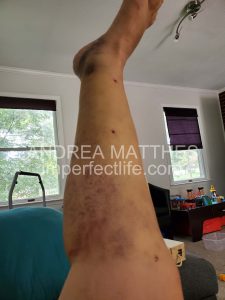Surprising Recovery Stuff that Seems Alarming but is Totally Normal
With each surgery I had bruising, post op swelling, and cording—the feeling of guitar strings (especially in my armpits and behind my knees) and hard ropes under the skin (especially on my inner thighs).
With my first and last surgeries I had incisions that leaked for four days. It was so gross and also very common, but looks like you’re bleeding to death. It’s mostly tumescent fluid (I had tumescent assisted liposuction) but it comes out looking like really water blood– like the kind that’s in packages of meat, and it smells disgusting! I wrapped the areas in maxi pads and puppy pads and just waited them out.
My toughest days were typically between day 6 to 12 post-op, when my body would look and feel the worst.
From about day 2 to day 13, I would look worse than before surgery which is the case with just about every woman who goes through these procedures.

During the first couple of weeks of recovery, a low inflammatory diet is especially helpful as any additional inflammation makes everything feel awful.
Here are a few bruising/healing pictures. I wish I had taken more because there were times when I looked much worse than any of these…
 What I’ve Learned
What I’ve Learned
The number one takeaway is that every woman’s experience with these surgeries is different.
Some women say…
Their pain was gone immediately after surgery, with the exception of the swelling and surgery pain.
They had excruciating nerve pain for months after surgery.
Their stomach blew up after leg and arm surgery.
They gained 30 pounds within a few months of having surgery.
They lost 40 pounds within a few months of having surgery.
They eat only keto.
They eat only vegan.
They eat “normal”.
They don’t have to wear compression anymore.
They still wear compression daily, 5 years post-op.
Their skin retracted perfectly.
Their skin is wrinkly and saggy.
They were back in the gym 2 weeks post op.
They were still on pain meds 3 weeks post op.
They were back at work 3 days later.
They were still taking it easy 4 weeks post op.
Their insurance paid in full.
Their insurance paid half.
Their insurance denied them and they are on their third round of appeals.
They gave up and took out a home equity loan to pay for surgery.
What You Need to Know
There are way too many variables to consider like: age, weight/BMI, stage of lipedema, overall health and mobility prior to surgery, the amount of fibrosis the surgeon had to fight, the surgeon’s technique (WAL, TAL, dry, etc.), the amount of fat removed, whether or not lipomas were present, general anesthesia vs local anesthesia, and the type of procedure they had done—liposuction is not the same as a abdominoplasty or brachioplasty.
We cannot assume our experience will be like anyone else’s. It may be close, but they really run the gamut.
As far as insurance goes, there are many variables to consider as well, including but not limited to: the type of insurance they have, how they went about getting the surgeries covered, did they get pre-approval, did they get in-for-out approval, what was their deductible, what was their max out of pocket, was the claim filed properly.
Let me say this again… DO NOT BE AFRAID TO FIGHT FOR YOURSELF AND YOUR BODY!
GO TO NEXT POST IN THIS SERIES
I hope you find the information in this series of posts helpful. If you have any questions, please don’t hesitate to email me.
<3 Andrea
Andrea Matthes
Body Image and Healthy Lifestyle Coach
Founder of I’mperfect Life, LLC.
FB: www.facebook.com/imperfectlife
IG: www.instagram.com/i.m.perfect.life
All content found this website, including: text and images, were created for informational purposes only. The Content is not intended to be a substitute for professional medical advice, diagnosis, or treatment. Always seek the advice of your physician or other qualified health provider with any questions you may have regarding a medical condition. Never disregard professional medical advice or delay in seeking it because of something you read in this document.
If you think you may have a medical emergency, call your doctor, go to the emergency department, or call 911 imm
PRESS HIGHLIGHTS






